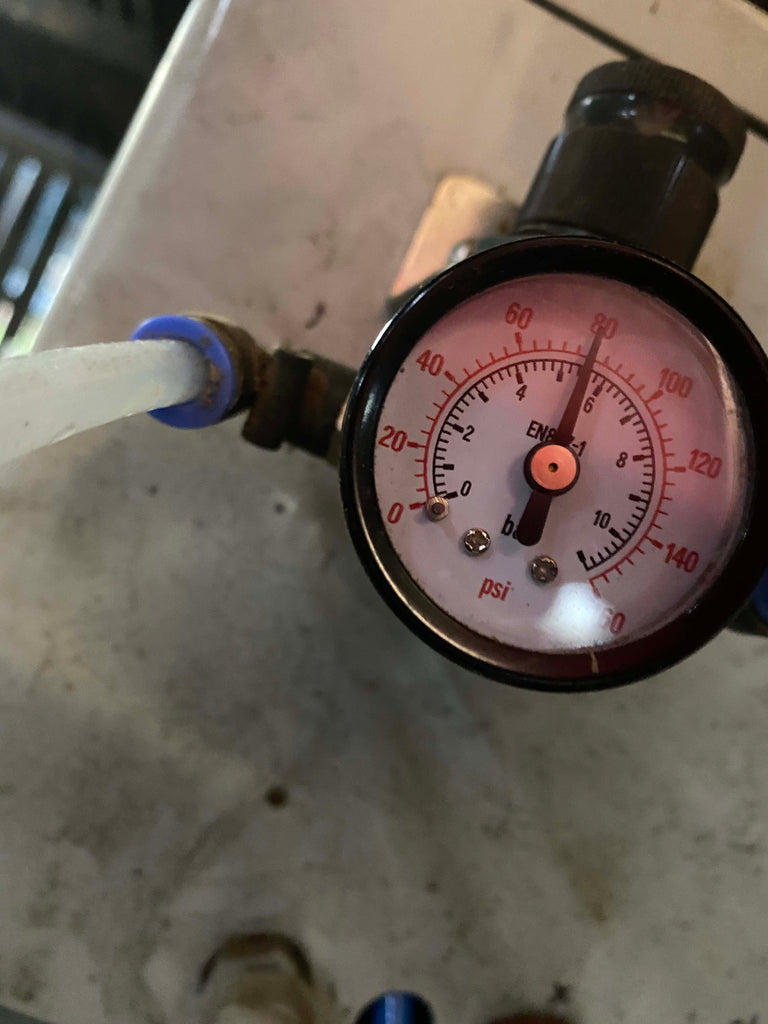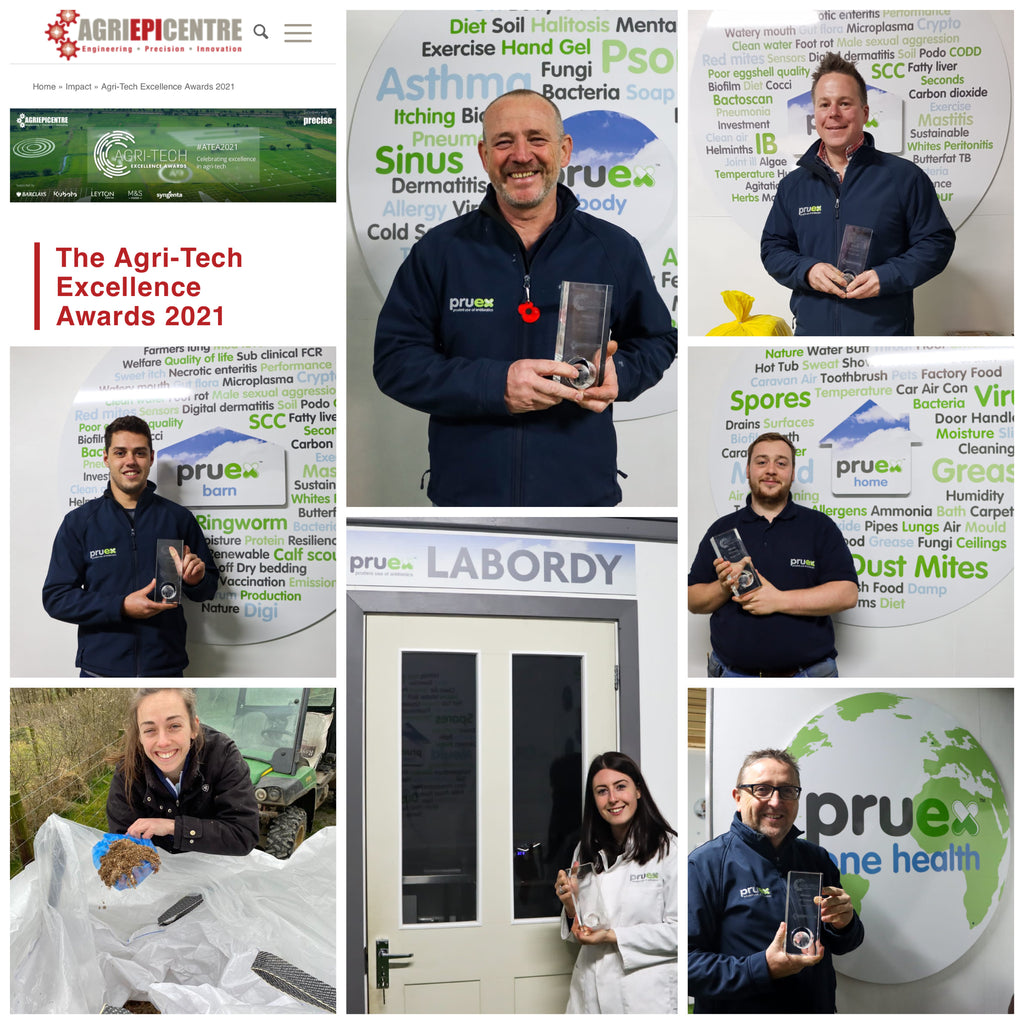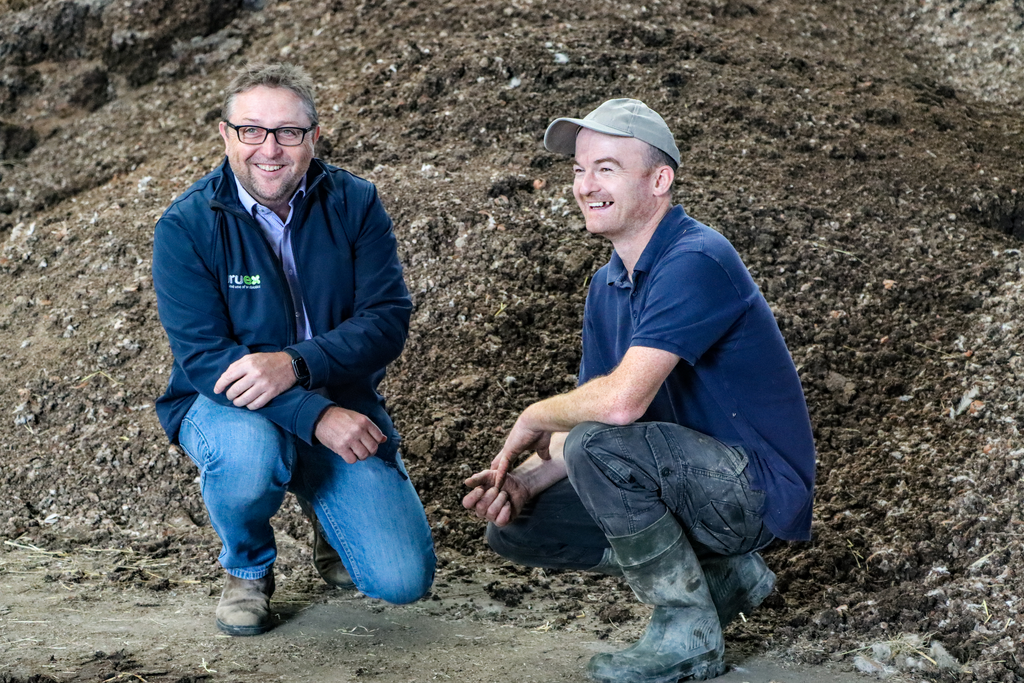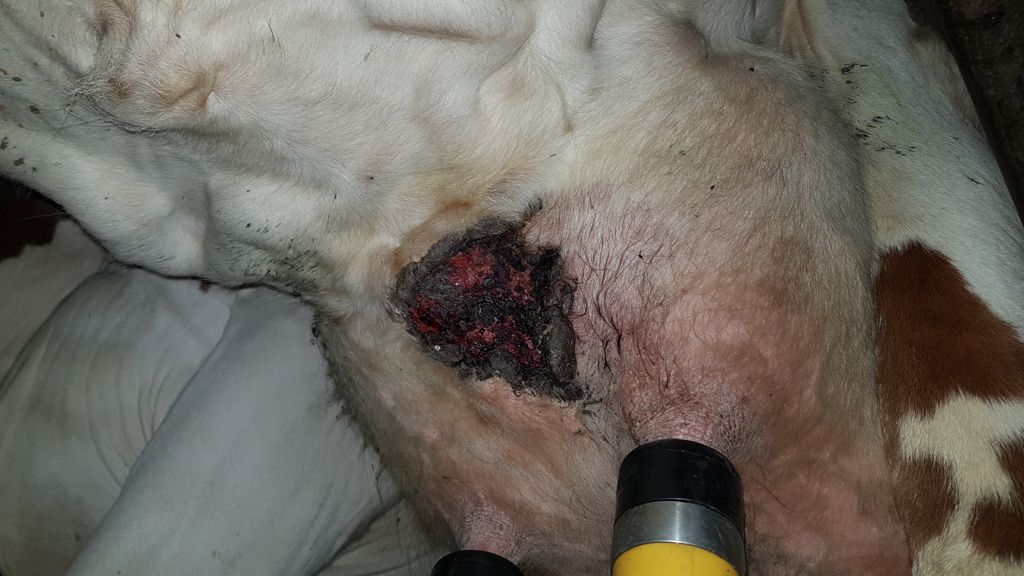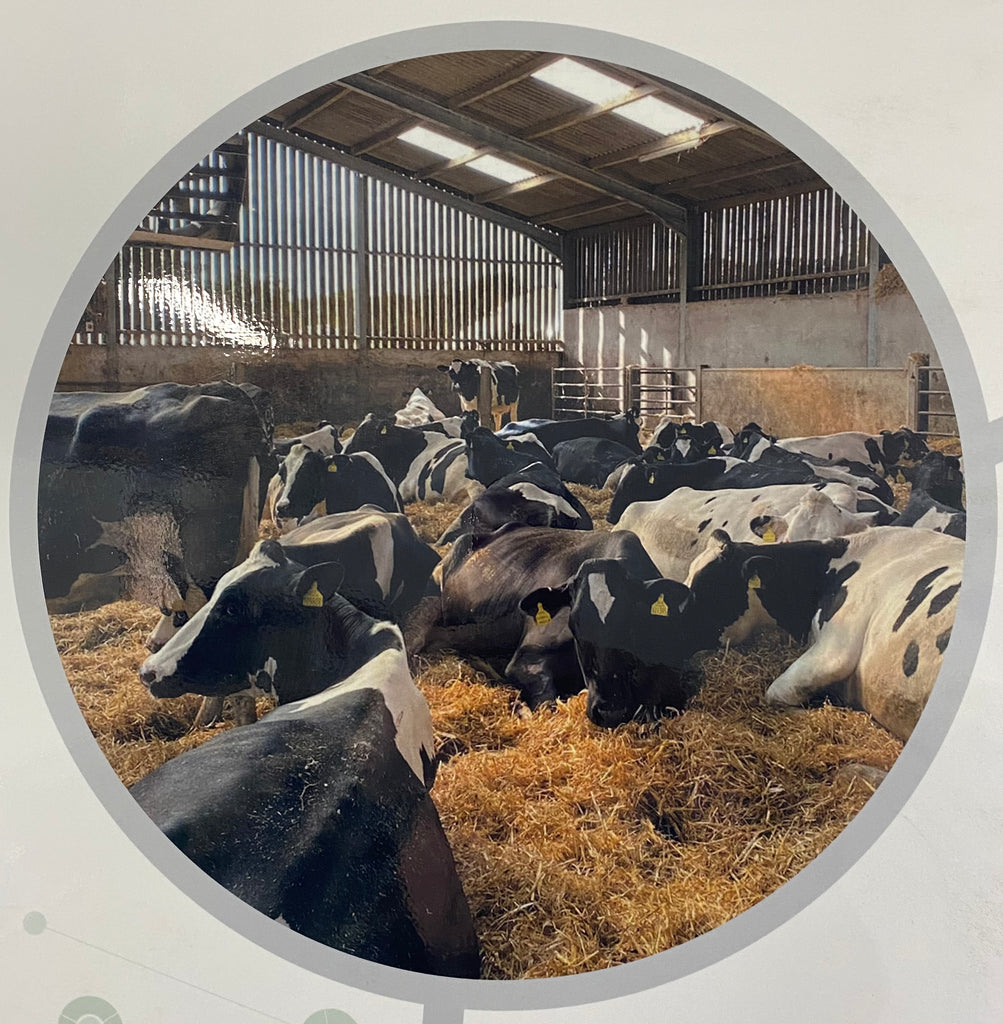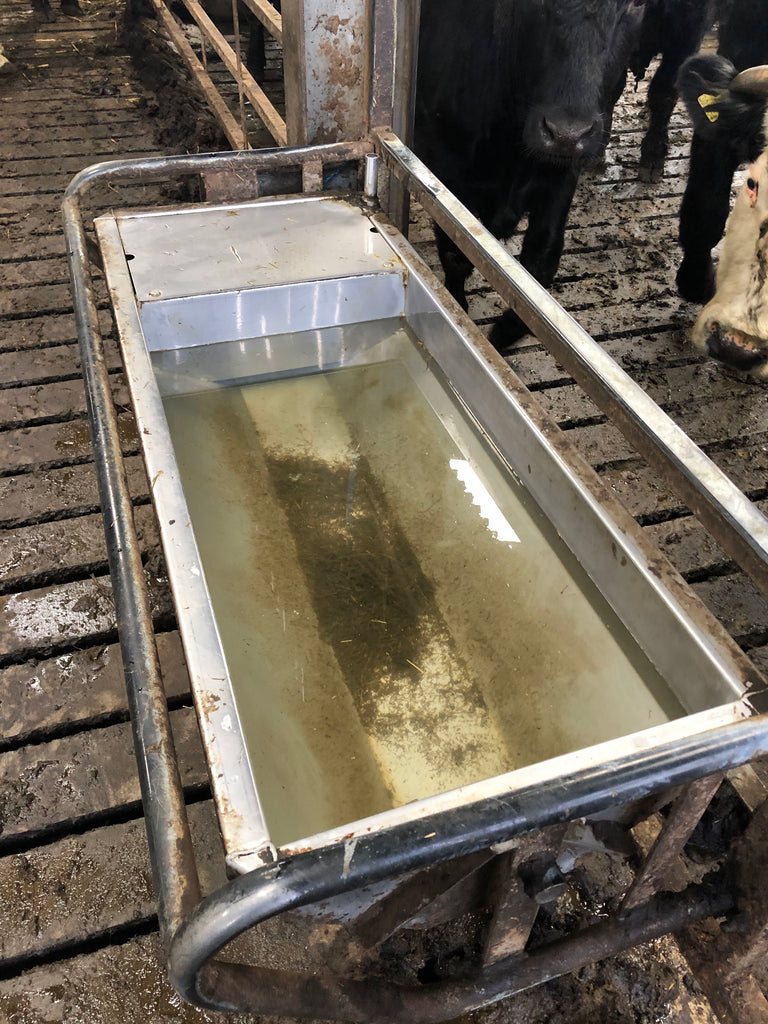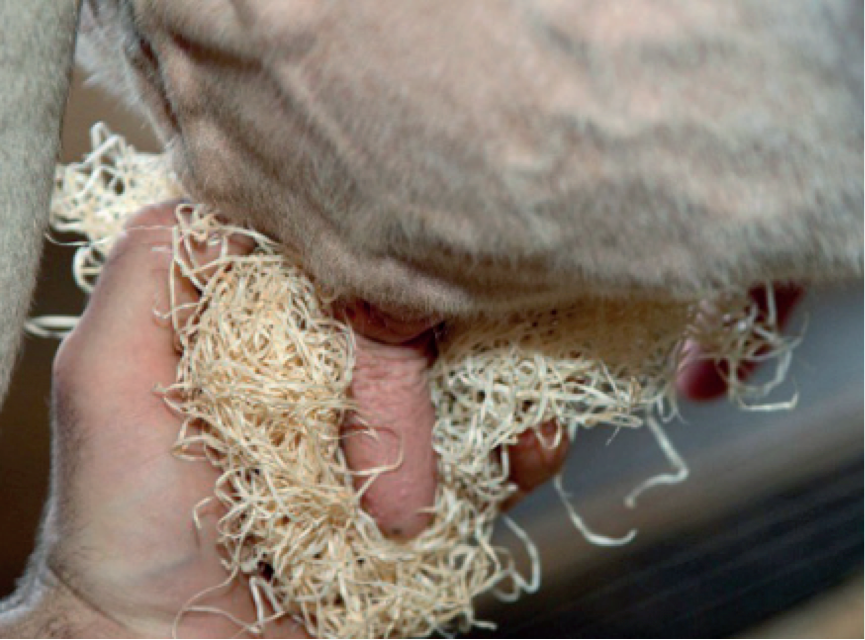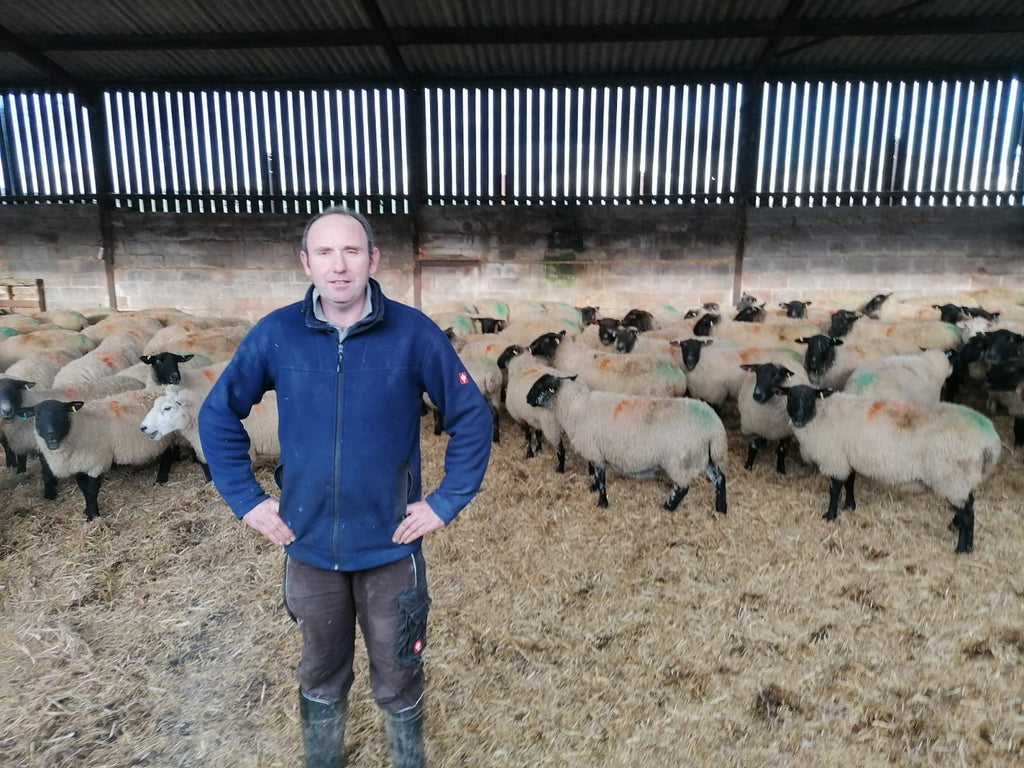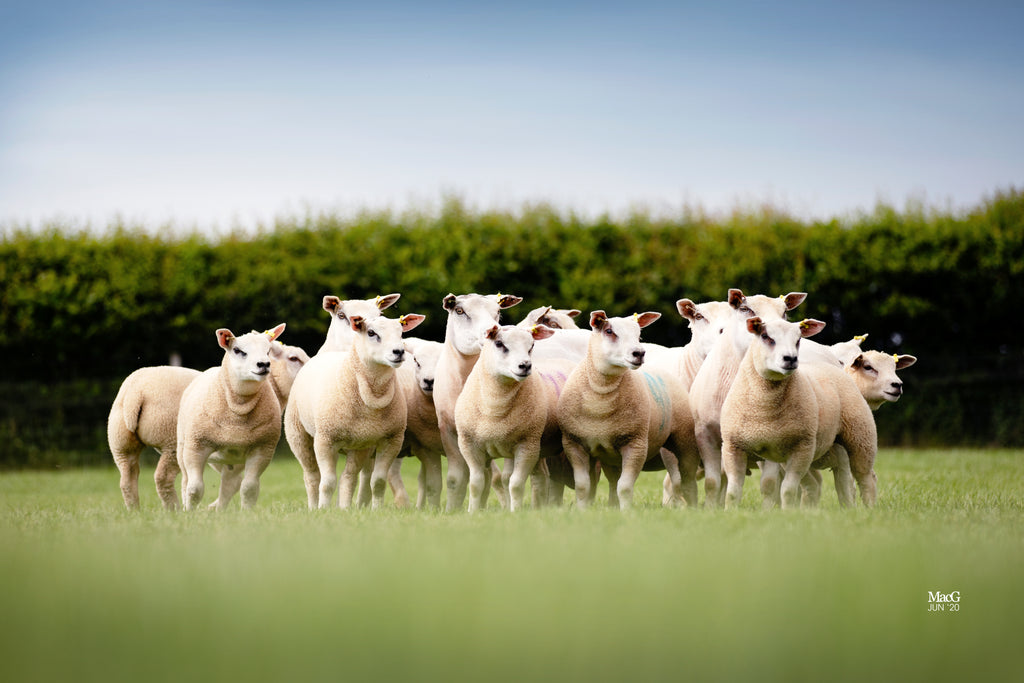News
Making the link between improved environment, welfare and increased production
Customers congratulate the Pruex team for winning the Agri Epi UK Innovation award
"The team at Pruex would like to thank our fantastic customers and those that have sent video, texts, emails, letters or have called to congratulate us on winning the Agri Epi Centre award for UK Innovation. We continue to learn with you all how to keep animals healthy and by doing so, reduce the need for antibiotics. Diolch yn Fawr." Aled Rhys Davies, founder.
Agri-EPI Centre’s agri-tech awards champions agri-tech innovators that have made a significant sustainable impact on-farm between January 2019- March 2021.
Award winning technology to dry out chicken litter with Pruex bacteria
On the 19th August a group of poultry farmers gathered at Wern Farm, near Welshpool to discuss ammonia and admire extremely dry chicken litter stored in the farm’s muck shed!

Kindly hosted by Osian Williams and family, with the support of Farming Connect, Pruex have been working with the farm to autonomize the application of non-infective bacteria within Osians layer sheds.
The use of smoke bombs allows us to visualise air flow within the two 16,000 bird multi- tiered sheds and best place sprayer units. Pruex bacteria is sprayed throughout the shed, adding nature back into industrialized agriculture to provide a healthier environment for the hens and the staff.

Pruex bacteria dry up the chicken litter and testing has revealed that moisture content in the muck on the belts has reduced by over 50% since Pruex bacteria has been applied. This has resulted in the frequency of mucking out of the manure belts being slashed from every three days to once a fortnight, reducing labour requirements by more than 75%.
Alongside drying up litter, ammonia levels have been reduced inside the building and the stored muck; a huge potential for tackling NVZ policies. Air quality is improved within the sheds for birds and staff, alongside the health benefits of reduced risk of disease bacteria dominating. At Wern, mortality has reduced by over 1% and there has been no requirement for antibiotics in the flock. Egg production has been optimised, saving £12,000 per flock, and feed requirements have reduced without losing production, leading to further cost savings.
Pruex’s automated spraying systems are increasing in popularity amongst farmers across the UK and have recently led them to being awarded Agri-Epi’s prestigious Agri-Tech Excellence award 2021.

To get started with a new farm, Pruex undertake an initial swabbing to identify the disease challenge on individual farms. If you are interested in getting started with Pruex and finding out the benefits of a Pruex system in your shed, please call 01558 509025.
Forequarter udder infections - a call to action
Having conducted two years commercial research work part funded by the the Government through ERDF via the Cornwall Development Company part of Cornwall Council, we have observed fantastic results in cleanliness of udders, feet and bedding. Infections of udders and feet as a result over our R&D period were seen to decrease.
Our cleaning process doesn’t involve disinfectant, antiseptic or antibiotics all of which aim to kill bacteria and can contribute to Antimicrobial resistance, AMR. The problem being that the newly cleaned surface quickly get repopulated often with the infective bugs that dominate the area. It’s impossible to keep a wound like the ones in the image sterile on commercial dairy farms. We need an innovative strategy, one which Pruex have developed in order to reduce stress on the suffering animal so that her own immune system is maintained at an efficient and effective level. That doesn’t mean that the immune system is improved, it means that the cow faces less challenges in her environment so that her immune system is less likely to collapse allowing the infection to flourish.
If you have cows with similar infections then we need to talk. Our office number is +441558509025
Can the dry period become a time of udder recovery when dry cows are housed?
Cow and Calf Health – Calving Strategies to limit the threat of infections.
Three hygiene and husbandry questions answered by Sarah Dusgate of Pruex Ltd.

Can calves born indoors ever be as healthy as those born outside in pastures that aren’t over stocked?
Yes they can, as long as our hygiene protocols ensure they are delivered into an environment that is as close as possible to nature. In other words, the bacteria that populates their skin and that of their mothers’ udder, originating from the bedding isn’t dominated by fecal, potentially pathogenic microorganisms. This resembles what they would get populated by if they landed on soil or pasture. Out in a clean, well-drained field, the bacteria present in the soil would not pose a great infection threat to the young calf. An over stocked calving pen, despite ample bedding would be dominated by fecal, potentially pathogenic bacteria, and if wet, could very well be harboring high levels of unicellular protozoa like Cryptosporidium. (Crypto)
Ventilation is often a concern when calving indoors, but the quality of air for cow and calf is determined by their bedding. Fecal bacteria make ammonia from the urea and uric acid in bedding. As we all know, colostrum is gold. Farmers will often concentrate on dry cow diets, but tend to ignore water quality. You can’t optimize colostrum quality if fecal bacteria dominate the water available for the cows to drink.
At Pruex, we work with farmers to measure their calving environments. If they are measured, then they can be managed. We introduce soil bacteria into these environments.
A daily spray of Pruex Stabiliser bacteria to bedding reduces the production of ammonia and dries up the bedding. This changes the domination of bacteria from fecal to soil, from harmful to harmless, and reduces the risk of infection.
We apply our Pruex Water Plus bacteria to drinking water to achieve clean, non-infective drinking water.
Some calves, if compromised by Crypto, do require nutritional supplementation. Pruex ATAL Youngstock Gut is a plant based liquid containing herbs such as Origano, Horsetail, Thyme and Loosetrife.
Calves born inside can be as healthy as those born outside, as long as we add more nature into their environment.
Can the cows’ immune system recover as efficiently when calving inside as it does when calving outside in pastures that aren’t over stocked?
Yes if the environment she is kept in presents similar levels of challenge as those faced by her outside. She will need to be adequately fed and have access to clean water, dry bedding dominated by non-infective bacteria, and clean air to breathe. Our strategy for dominating bedding and water with non-infective bacteria become really important in achieving these goals.
Yes, if the environment the cows are kept and the water they drink are dominated by non-infective bacteria. In addition to a daily spray of the bedding with Pruex Stabiliser bacteria, and daily treatment of drinking water with Pruex Water Plus bacteria, Pruex have herbal products to help during the transition period.
At the end of lactation, cows often produce high levels of milk that can be problematic when it comes to drying them off. We use Pruex Gallic Dry, an oral paste containing herbs that help them naturally reduce their milk production.
At calving we use another herbal product - Pruex Post Calving Bolus to help them recover from the processes of giving birth and cleansing. Clean cows post calving being the goal.
Pruex is a One Health company that inspires Prudent as Opposed to Excessive antibiotic use in Human and animal markets. Pruex.co.uk
Is clean, non-infective water a nutrient that gets overlooked by stockmen to the health detriment of their livestock?
We all know that water is vital to survival, and we know that cows can get some of their daily needs from the moisture contained within their feed. Every stockman will know that cows need plenty of clean water to produce milk. However, do they understand that poor water quality can result in herd health complications?
Farmers will have strategies for ensuring clean water. They may have Ultra Violet filters at the source of water on-farm, they may have a weekly rota whereby different staff are tasked with brushing the slime on the walls of the water troughs. Do they understand the cause of that said slime, and the effect it has on their livestock health? That slime is biofilm, a nest built by bacteria using the mineral in the water. Those bacteria can produce toxins that are problematic for the cows that drink the water. “The toll on the immune system could explain why some chronic mastitis cow become clinical” says Zoe Davies, operations manager at Pruex Ltd.

Pruex work with farmers to ensure that bacterial biofilms don’t become problematic on farm. The company has developed a three-fold strategy to ensure optimum quality drinking water for livestock.
-
Find,
- The Find process involves microbiology testing of existing biofilms.
-
Fix,
- Based on the results the Fix involves daily dosing of Pruex Water Plus bacteria into the drinking water. This changes the population of biofilms from harmful to harmless and reduces the risk of infections on farm. The protocols applied on farm are reducing the need for antibiotics by over 70%.
-
Tell
- The Tell process involves a discussion with consumers of the good work done in agriculture to reduce the need for antibiotics.
.
“You can’t have clean milk if you give your cows dirty water. Our work on European and African farms demonstrates this point on a daily basis.” says Miss Davies. Farmers looking to improve herd health and drinking water quality are encouraged to contact Pruex.
Pruex is a One Health company that inspires Prudent as Opposed to Excessive antibiotic use in Human and animal markets. Pruex.co.uk
Is rapid milk letdown more important in the battle to reduce sub clinical mastitis than a sterile teat at milking?
That is a question that Pruex Ltd has been examining over the last four years. The company aims to lead the fight against anti microbial resistance (AMR), and was set up by Aled Rhys Davies as a result of conducting a Nuffield Farming Scholarship looking at antibiotic use in agriculture and aquaculture. Pruex advocates Prudent as opposed to Excessive antibiotic use.
“In assessing the limited available data around this issue, we realised that there were other questions that needed answering. For example, how much does teat end damage account for in high Somatic Cell Count (SCC), chronic and/or clinical cases of mastitis? Are the biocide chemicals applied to cows teats pre milking in an attempt to achieve sterility not only detrimental to the skin integrity of the teat, but also to the taste of the end product, either as fresh milk or as processed food? What happens in nature, and is there a way to introduce natural products into our modern milk production to limit the need for antibiotic treatment of bacterial infections? Says Aled Davies
In 2019, Pruex were commended an Antibiotic Guardian award by Public Health England for the innovative work they conduct in agriculture. “Good science is based on observations. We take our inspiration from nature. The cows’ udder won’t be sterile when the calf goes to suck, it would probably be coated in soil that won’t cause any infection danger for the calf. The cow, sensing the presence of the calf lets down its milk allowing the flow on nutrition to the calf without damaging the cows’ teat end. Clinical mastitis cases in nature are few and far between as a result.“ Says Mr. Davies
Modern milk production does differ quite substantially from the natural model. The cow doesn’t sense the presence of the calf, so has to be stimulated to let down its milk. Application and sometimes removal of biocides to teat surfaces by brush, foam, spray or cloth can help the process of stimulating milk let down whilst attempting to achieve sterility. But sub clinical, chronic and clinical infections are prevalent within the industry. The vacuum or pulsation used in the milking process can quickly damage a teat end if the cow doesn’t let down her milk resulting in as site of potential infection post milking. The National Mastitis plan indicates that 35 cases per 100 cows is a target that farmers should look to achieve. That suggests that on many farms, there are greater than 35% of cows infected annually. This data assumes that any cow with a SCC over 200 is regarded as having a sub clinical infection.
“In Switzerland and France, there is a different product used pre milking. Wood Wool, a tangled mess of thin strips of planed wood, similar in look to thin spaghetti, or the timber equivalent of wire wool. Yes, the sap in the wood has biocide properties, but the objective of using a good handful to brush the udder ahead of milking is mainly to stimulate milk let down. By brushing the udder, you remove dirt, and the sensation of the wood wool rubbing the skin of the udder must resemble that of a calf attempting to suck as the cow lets down its milk rapidly.” Says Mr. Davies
Two scientific trials, one from Switzerland and the other from France confirmed that Wood Wool cleaning of udders pre milking resulted in less udder infections as measured by SCC than biocide cleaning. “This does suggest that the speed of milk let down is an important factor in reducing udder infections on dairy farms, and is the main reason that we at Pruex supply this natural product to our customers” Says Mr.Davies
Pruex are a One Health company that look to inspire Prudent as Opposed to Excessive antibiotic use in Human and animal markets.
Adding some nature inside poultry sheds during the bird-flu lockdown
In December 2020, poultry farms in the United Kingdom experienced a lockdown due to the growing threat of bird flu. Farmers are having to keep their birds shut inside buildings that just aren’t designed for poultry to be housed in 24/7.
Pruex work with farmers to FIND the cause of disease, FIX using our toolbox and TELL the good story being done by farmers. Here is a bit about what we have been finding on poultry farms over the last few months.
1. FIND
What we have found during the bird flu lockdown is that professional free range systems and even back yard poultry keepers have sheds and buildings that are not designed for birds to be housed in 24/7.
We are discovering that ventilation is being affected by pop holes having to stay closed and this subsequently effects the airflow, temperature, humidity and gases within poultry sheds.
Birds are having to be kept in closer proximity than they usually would be, resulting in faeces and moisture building up quickly and litter becoming wetter.
E.Coli and other disease causing bacteria are found naturally in livestock environments, however by keeping animals housed 24/7, we are removing them further and further from their ‘natural’ environments. This is where we experience problems. Increases in moisture within buildings can lead to increases in the build up of harmful disease-causing biofilms dominating our animal environments. Biofilms can develop beneath litter, on cladding and within the water systems, which we ultimately see resulting in increased disease and reduced production in animals.
We use bacteriology and sensor analysis to identify the causes of disease on individual farms.


2. FIX
In the unprecedented times poultry farmers are experiencing, Pruex work to bring some nature back inside the poultry shed.
When birds are able to range on pasture, they get contact with soil bacteria on their feet and beaks. When they are housed, the litter they stand on and scratch in is often dominated with harmful bugs which are challenging their immune systems.
Pruex work to add beneficial bacteria INSIDE poultry sheds to dominate the environment with non-infective bacteria and reduce the risk of harmful biofilms dominating. This can be done using our varied toolbox to fix the problems we find on our initial visits.
We spray bacteria in to sheds and dominate water with beneficial bacteria, this can be done manually or using automated equipment. We supply enrichment bales which have added Pruex bacteria, to replicate scratching in the soil. We are able to reduce the risk of harmful biofilms dominating whist the birds are still in the shed!


3. TELL
The farmers we work with tell us of the benefits they see in their animals, including reduced need for antibiotics, reduced mortality and increased production. Litter stays drier, last longer and air quality improves. This also improves the working environment for staff.
It is our role to spread this good message within agriculture, and to consumers of food raised with optimum levels of animal welfare.
Please get in touch for more information. 01558 509025. www.pruex.co.uk
Focusing on the environment, nutrition and stock allows fantastic reductions in antibiotic use.
Jack Foulks and his Family farm in Anglesey running a flock of 3,000 Suffolk cross Texel cross mule breeding ewes lambing in February.
Due to a high rainfall area lambing takes place indoors between the months of January and early April, with the majority of lambs born in February. Ewes are housed from the start of December. “Before implementing the Pruex 5 point plan in 2019 we did
have a problem with E Coli scours in the lambs and numerous cases of joint ill. We didn’t loose many lambs, but did have to use more antibiotics than we’d want to limit the problem.” Said Jack. Each lamb was given an oral antibiotic treatment along with a penicillin injection. “Our successes in reducing our issues aren’t purely down to using Pruex products to ensure a dry bed, clean air and pure water, we have also worked on the nutrition of the ewes with the renowned vet Kate Hovers. Getting all things right can make a real difference. Since we’ve used the Pruex Water Plus treatment via a dosatron and misted our bedding with Pruex Stabiliser, the E Coli scours have stopped and we have also ended the problematic blanket treatment of antibiotics.” Said Jack
The ewes bedding is noticeably dryer. “When Aled told me to use a liquid product to dry up the bedding, if I’m honest, to start with I didn’t believe him, but it really does dry up the bedding. We don’t use a great deal less straw but I think that’s because the ewes seem to eat more of it than they used to. We aim to keep the ewes as clean as possible and the Pruex Stabiliser certainly helps in that respect”
Driving down mastitis at lambing and at turnout
Ingram Family Logie Durno
The Ingram’s are well known across the UK and further afield for their sheep enterprise at Logie Durno farm in Inverurie. The 3,500 strong ewe base of pedigree and cross breed ewes produce over 800 rams annually that are sold at their on farm sale, national society sales and NSA sales. The family produce rams for both the maternal and terminal market, with the pedigree and terminal flocks lambed indoors from December, with the indoor lambing concluding at the end of April.
“The family being well known and respected within the industry are drivers of positive change to outdated practices” says Aled Davies founder of Pruex.
Ewes are lambed on a mix of straw and sawdust beds with ewes spending as little time indoors as possible. They are brought indoors once the first ewe from that cycle lambs outdoors. Ewes are lambed indoors for ease of management and for ease of data capture such as birth weights, parental details and ease of lambing recorded prior to turnout.
Gregor Ingram approached Pruex in 2019 with the aim of limiting antibiotic, chemical use and input cost, with a focus on preventing rather than curing disease.
The Pruex Five Point Plan was adopted in 2019: • Water Plus treatment was applied via the farms borehole treating the whole water system. • Pruex Stabiliser was misted daily on the bedding, loose pens and individual mothering pens. • No corners were missed with the pet lamb group on a shepherdess feeding system also being treated.
The big difference seen by Gregor and the family was the reduction in the mastitis cases on the farm both immediately in the lambing shed and following turn out. “We had hardly any mastitis this year in the ewes, as toxic bacteria pressure was reduced. The ewes seemed to be leaving the shed a lot cleaner and healthier, and they have remained healthy throughout the year with the lambs and ewes also performing well.” The farm even noted an improvement in the pet lambs with “batches weaning off the machines cleaner and healthier with much improved performance following weaning,” said Gregor.
The focus for the 2020 season will be to drive down antibiotic usage on the farm by further reducing the mastitis cases as well as a focus on lameness within the flock.” This should be a big focus for sheep farmers across the UK” states Gregor. “The family being well known and respected within the industry are drivers of positive change to outdated practices” says Aled Davies founder of Pruex.

